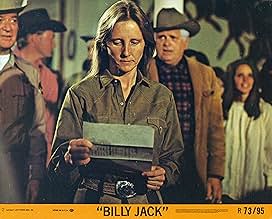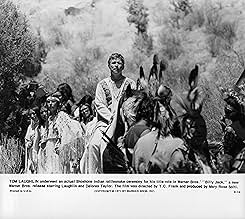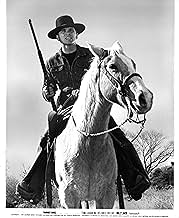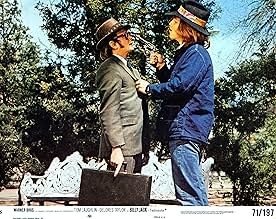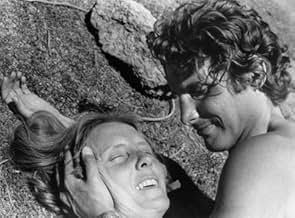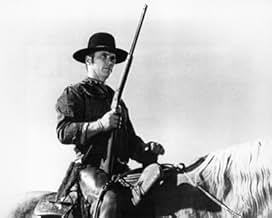Füge eine Handlung in deiner Sprache hinzuEx-Green Beret hapkido expert saves wild horses from being slaughtered for dog food and helps protect a desert "freedom school" for runaways.Ex-Green Beret hapkido expert saves wild horses from being slaughtered for dog food and helps protect a desert "freedom school" for runaways.Ex-Green Beret hapkido expert saves wild horses from being slaughtered for dog food and helps protect a desert "freedom school" for runaways.
- Regie
- Drehbuch
- Hauptbesetzung
- Auszeichnungen
- 1 Gewinn & 2 Nominierungen insgesamt
- O.K. Corrales
- (as Allan Meyerson)
Empfohlene Bewertungen
Even though the film's portrayal of these themes was dated and perhaps unrealistically idealistic, it spoke of truth and sacrifice and one man's devotion to these ideals. billly jack is a hero. sometimes evil needs to be stamped out and billy did this with his feet. He always gave fair warning of consequences and a way out but inevitably they chose to side with evil and not good. the most compelling part of this movie was the love he shared
The New Left movement which really became influential around 1972 and years following was the hippie fringe in 69.
This movie is simply a lot of fun. To insist it be more than that is unrealistic. It was independently produced by a guy (Laughlin) who believed in his message, wrote it and called all the shots himself. Its really not bad taken in that context. The little blonde girl singing the anti-war song is Tom and Delores' real life daughter Theresa. The comedy troupes used to appear on shows like the Smothers Brothers and were considered "way out". =) (amazing how cynical we've become isn't it??) While most of America in those days was more like the townspeople than the school people, it is still very very entertaining to see those days played out again.
The start of the film really has nothing to do with Billy Jack. It is a deputy in the town having his runaway teen daughter returned to him. She tells him she is pregnant and she has been with so many guys she doesn't even know the father's race. Dad explodes in anger and beats her. The deputy panics and dumps what may be her "body" for all he knows out in the wild. Billy Jack finds the girl and hides her at The Freedom School - a counterculture alternative school with mainly native students, but the school is open to any kid with problems.
So the rest of the movie is based on the deputy's lie that his daughter ran away again, that she is pregnant, and that a boy at the Freedom School is the father. And weirdly enough, deputy dad never recants this story, and seems to come to believe it himself.
Now things were never great between the counterculture pacifist school and the traditional townspeople, but the story of the deputy's daughter brings things to a boil.
And in the middle of all of this is Billy Jack, a half native American ex special forces vet who protects the school - as best as one guy can - with physical force when he has to, and plus he really seems to enjoy it too. And the film gives you two hissable villains, town political boss Posner and his bullying cowardly son Bernard, always retreating to the safety of dad's shadow when his misdeeds get him in bad with Billy Jack.
This film only cost 800K to make yet raked in 33 million with largely wooden acting, a script that meanders and often contradicts itself, and lots of on location shooting so that expensive sets were not needed. So why did people flock to this little indie in droves? Because if you want to understand the Vietnam era and counterculture movement of the late 60s/early 70s I would say watch this film rather than the more famous and acclaimed "All In the Family". The hypocritical and racist townsfolk - often to the point of being cartoonish - actually symbolize how the oldest crop of the boomers saw the establishment. Billy Jack really did symbolize a hero as he had to be, where Jean was a hero/heroine the way people would have liked to be. And it had much to say about the ugliness of racism practiced by everyday people.
For film history buffs, I would say this film is worthwhile. It also has many quotable quotes, and if you look carefully you'll see Howard Hesseman (Doctor Johnny Fever of WKRP in Cincinnati) in a very small and early role as a drama teacher at the school who shows up at a hearing about closing the school and recites a speech that he at first claims is by George Washington, and then reveals it was written by Adolph himself. Not that this speech had anything to do with what the hearing was about, and such is the disorganized symbol of an era that this film became.
Billy Jack is played by Tom Laughlin, who does not look much like a half Indian. Also, altho he has martial arts fluidity against the villains, he is quite rigid in posture, the white man that he is. Like his split background, I thought his acting performance was uneven -- at times good, at times wooden. Let me comment that he was not impressive in the final scene, which was not moving to me. Jean Roberts (Delores Taylor), sort of Billy's love interest, runs the Freedom School. She is the passionate figure of the movie, but certainly only platonically.
One curiousity is what the director is trying to do with the character of Sheriff Cole, a compromising personality, but who overall seems to be presented favorably. A good man rather than bad like the rest of the town, he is unable and unwilling to mount an effective resistance to the bad guys tho he serves as a go-between, helps Billy and the Freedom Schoolers behind the scenes, and yes, once, rescues Billy, by, sort of, standing up against the beaters. Like Billy, he is totally outnumbered by pretty much an entirely bad white community, like the prosecutor in the Mississippi civil rights murder cases trying to convince the jury. But I say, his is a refreshing role to me, because he is, well, the most normal person.
So, American Indians have been mistreated? We all know that, but what does this movie tell us about it, the background, the problem as it exists today (OK, 30 years ago), the solution? So we have peace-loving hippies and Indians, whining, whining, directed at the bad guys, nothing else. So?
What was the Freedom School all about? Well, it opposes the establishment. We know. But what does it do, what do you learn, what do you accomplish, what are you prepared for? Well, we hear diatribes, but where are we going? Maybe inherently nowhere.
Thus, "Billy Jack" mainly functions for its superficial visual (and audio) images, spirit of the '60s. But the storyline still captures the viewer. There are the abusive bad guys, we are worked up against them, the guy in the white hat (sort of) comes to the rescue. And if we don't totally understand what the Freedom School is all about, we at least know some of its political stances, and something of its style, even if the way the movie presents them is silly.
This all adds up to an annoying sanctimoniousness that serves as a turnoff. Tho the conservative characters are stereotyped, they are developed better than the Freedom Schoolers, who are poorly acted, cheesy, and certainly not compelling.
The true irony of "Billy Jack" is that the pacifist Freedom School contradicts what made people go see the movie. How many went, or would go, to see it, and how many went to see the fight scenes? Anyway, the score is quite good.
Wusstest du schon
- WissenswertesTom Laughlin had no martial arts training before he started training for the movie. He studied under a master teacher for six months before filming started.
- PatzerMartin credits the Serenity Prayer to St. Francis of Assisi. It was actually written by American theologian Reinhold Niebuhr, and first published in the 1930s.
- Zitate
[Billy Jack is surrounded by Posner's thugs]
Mr. Posner: You really think those Green Beret Karate tricks are gonna help you against all these boys?
Billy Jack: Well, it doesn't look to me like I really have any choice now, does it?
Mr. Posner: [laughing] That's right, you don't.
Billy Jack: You know what I think I'm gonna do then? Just for the hell of it?
Mr. Posner: Tell me.
Billy Jack: I'm gonna take this right foot, and I'm gonna whop you on that side of your face...
[points to Posner's right cheek]
Billy Jack: ...and you wanna know something? There's not a damn thing you're gonna be able to do about it.
Mr. Posner: Really?
Billy Jack: Really.
[kicks Posner's right cheek, sending him to the ground]
- Crazy Credits"Directed by T.C. Frank" Tom Laughlin's pseudonym in honor of his children Teresa, Christina and Frank.
- VerbindungenFeatured in Precious Images (1986)
- SoundtracksOne Tin Soldier
Performed by Coven
Sung by Jinx Dawson of Coven
Written by Dennis Lambert and Brian Potter
Top-Auswahl
Details
Box Office
- Budget
- 800.000 $ (geschätzt)
- Laufzeit1 Stunde 54 Minuten
- Sound-Mix
Zu dieser Seite beitragen



